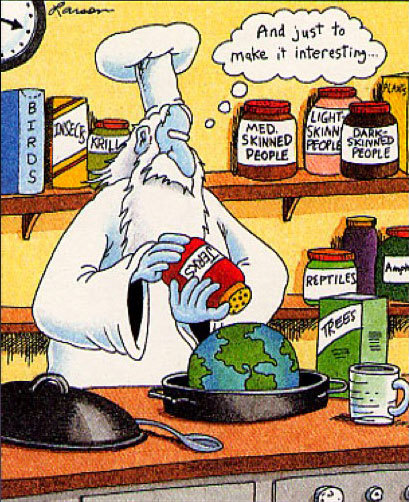This week I got through one of those new books I got in the mail (mentioned here) a couple of weeks ago: Among the Creationists: Dispatches from the Anti-Evolutionist Front Line. It is by a mathematics professor at James Madison University by the name of Jason Rosenhouse, who is a self-professed atheist (though Jewish in cultural/religious background). He got interested in creationism while holding a position at Kansas State University involved with implementing mathematics standards in public school education in Kansas. He heard about a conference related to science education in Kansas, and on a whim decided to go. It turned out to feature Answers in Genesis speakers like Ken Ham. He reports from this conference, "It was clear that, from their perspective, evangelical Christianity was a tiny island of righteousness adrift in a sea of secular evil" (p. 3-4). Thus began a fascination with that insular community by Rosenhouse, and he spent the next ten years going to their conferences. The book is a collection of stories from these conferences and Rosenhouse's reflections on the movement. He didn't become a Christian in the process, but some of his conclusions might surprise those who are members of the aforementioned insular community. He says,
I do know these experiences have had a salutary effect on me. It is far more difficult to caricature and stereotype people you have actually met. Have a few conversations over lunch or during breaks at conferences, and suddenly they are no longer abstractions or types. They are no longer defined by a few odd beliefs you have heard that they hold. They become actual people, with depth and personality and reasons for the things they believe. (p. 15)The stories range through conferences like that one which was mostly propaganda, to the more scientifically serious conferences like the International Conference on Creationism, where credentialed scientists grapple with the science implied by their positions. Rosenhouse discusses primarily the young earth variety of creationism, but also Intelligent Design and Evolutionary Creationism (aka theistic evolution). No matter where you fall on that spectrum, the book is worth reading. His treatment is fair and illuminating. On this latter point, the book is like a mirror being held up to someone who hasn't seen himself for awhile--perhaps he was stranded on a desert island for some years; he probably knew that he looked different than the image of himself he carried in his head, but actually seeing himself the way others do is undoubtedly a little startling. Rosenhouse paints an accurate picture of the way many of us look to outsiders.
On the former point--fairness--we only have Rosenhouse's versions of his conversations and interactions, but they sound entirely plausible from my experience. And he is very quick to say that to the surprise of many, he was always treated well at these conferences, he was never boo-ed or hooted off the microphone during the question answer sessions, people entered into dialogue with him and sometimes admitted when he had exposed a problem with their thinking.
I certainly don't agree with everything he says, but his conclusion needs to be taken seriously. Here it is:
Evolution challenges the claims of the Bible, refutes Paley's version of the design argument, exacerbates the problem of evil, and seems to diminish human significance. Any one of these points is worrisome, but all four together amount to a strong cumulative case against the possibility of harmony between evolution and Christianity. (p. 218).We in the Church cannot ignore books like this. On that count, I've been invited to talk to one of the large Sunday School classes at my church on Sunday about evolution. The talk is not going to be of the sort that merely claims evolution to be absurd and ridiculous. It's not (referent of the pronoun intentionally left vague). We need to figure out what to do about it.

No comments:
Post a Comment